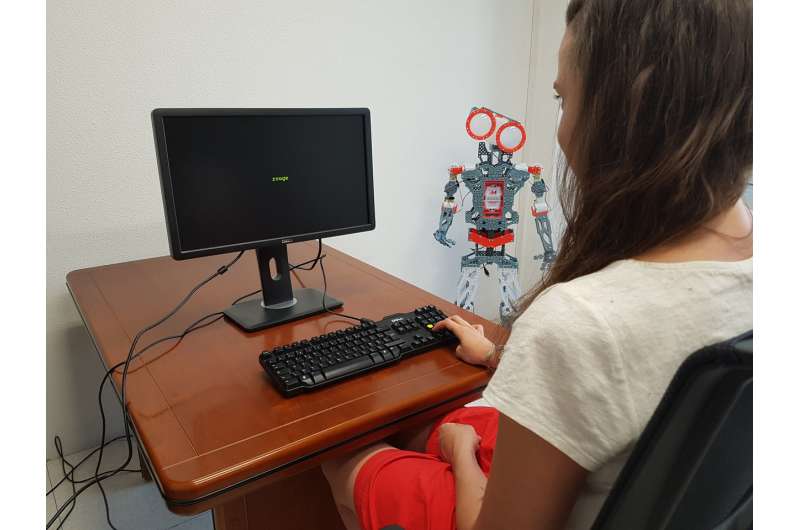August 16, 2018 report
Presence of 'mean' robot found to improve human concentration

A team of researchers from institutions in France and Switzerland has found that people asked to do a concentration test performed better when a "mean" robot was watching them. In their paper published in the journal Science Robotics, the group describes experiments they carried out with human volunteers and robots and what they found.
Most of us know that the presence of another person watching us as we do something can have an impact on how well we do—some student athletes perform better when their parents are watching, for example. But what about when a robot is watching? That was what the researchers with this new effort sought to find out. They set up and carried out an experiment designed to measure the impact of a robot watching a person trying to accomplish a mentally challenging task.
The experiment consisted of asking volunteers to carry out what is known in psychology circles as the Stroop Task, in which a subject is shown a single word printed in a random color on a video screen. The selects the key that signifies the color of the word, rather than its meaning—a test of concentration. This whole process is repeated multiple times.
After completing the task, the volunteers were asked to converse with a Meccanoid robot—in some scenarios, the Meccanoid was programmed to respond in kind, considerate ways. In others, it was programmed to be rude and obnoxious.

Following their conversation with the robot, the volunteers were asked to do the Stroop Task again while the robot they had conversed with earlier watched them.
The researchers report that those people who had conversed with the "mean" robot performed significantly better the second time around. Those who had conversed with a "nice" robot, on the other hand, performed about the same as did those in a control group who did not speak to a robot and were not observed by one. The researchers suggest that the presence of the "mean" robot appeared to have caused the volunteers to be more alert. But human teachers need not worry about being replaced, apparently, as another group recently found that robots will never replace teachers, though they can boost children's education.
Also, this is not the only experiment that has found that humans may respond differently when a robot is watching. Another team recently found that children will intentionally give wrong answers on a test if a robot does so first.
More information: Nicolas Spatola et al. Not as bad as it seems: When the presence of a threatening humanoid robot improves human performance, Science Robotics (2018). DOI: 10.1126/scirobotics.aat5843
Abstract
"Bad" humanoid robots just paying attention to human performance may energize attentional control—as does human presence.
© 2018 Tech Xplore



















